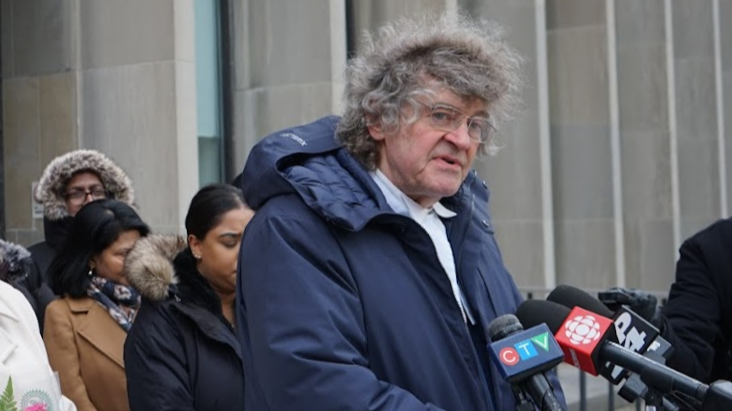Swept up in a Conservative-led filibuster, 'Milgaard's Law' set to reach Senate in coming months
Delayed in a filibuster led by Pierre Poilievre in December, the legislation proposed in the hopes of improving Canada’s ability to root out wrongful convictions is expected to reach the Senate in the coming months.
Bill C-40, introduced by the Liberal government in February 2023, seeks to expedite the process of reviewing wrongful conviction claims by rerouting the responsibilities away from the Ministry of Justice to an independent committee.
- Download our app to get local alerts on your device
- Get the latest local updates right to your inbox
The bill is named after the late David and Joyce Milgaard. David Milgaard, a man from Winnipeg, MB., was wrongfully convicted of the rape and murder of Gail Miller in 1970.
Twenty-seven years later, after Toronto lawyer James Lockyer took on the case under the organization Innocence Canada, Milgaard was exonerated. Results of tests on Miller’s clothing ordered by Lockyer showed another man’s DNA.
David’s mother, Joyce, spent the nearly three decades that her son was incarcerated advocating for his release.
“When you were in David’s presence, you felt an innate goodness from him,” Lockyer recalled to CTV News Toronto in an interview. Milgaard died in 2022, two years after his mother. “It [Bill C-40] is a remarkable testament to them. Assuming it’s passed, it will help keep them forever in our memories.”
 David Milgaard, who spent 23 years in prison after being wrongfully convicted of murder, is photographed after a press conference held by Innocence Canada in Toronto on October 9, 2019. THE CANADIAN PRESS/Chris Young
David Milgaard, who spent 23 years in prison after being wrongfully convicted of murder, is photographed after a press conference held by Innocence Canada in Toronto on October 9, 2019. THE CANADIAN PRESS/Chris Young
The bill was one of many pieces of proposed legislation subject to the Conservative’s marathon attempt to quash the federal Carbon tax on Dec. 8; “There will be no rest until the tax is gone,” Poilievre told the House on the day.
- READ MORE: Marathon Conservative carbon tax filibuster ends after nearly 30 consecutive hours of House votes
“It wasn’t getting anywhere,” Lockyer, who helped craft the bill, said. “It seemed pretty childish, the actions of the Conservations, but that’s what they did.”
When reached for comment, spokesperson for the Ministry of Justice Chantalle Aubertin called the move an "unhelpful obstruction of important work."
“We are disappointed that the Conservatives played politics at committee stage with the fundamental rights and the lives of Canadians, and their families, while there are women and men detained awaiting case reviews that could offer them a chance to reclaim their lives and return home," Aubertin said. "Overturning a wrongful conviction should be a priority for every parliamentarian and never a partisan issue."
After 30 hours of tactics, the filibuster came to a close, but the day’s events would stall the progress of the proposed legislation by nearly a month – it didn’t clear the review stage until Feb. 7 when it was reported back to the House with amendments.
Pending a third reading, “they’re hoping it will reach the senate in the next few months,” Lockyer said.
As it stands, applications to have the federal government review a conviction are screened and investigated by the Criminal Conviction Review Group, which then submits its findings to the Minister of Justice. If the minister has grounds to believe a miscarriage of justice has been served, they can order a new trial or hearing for the applicant directly, or they can refer their case back to the court of appeal.
It’s a slow process – one that takes, on average, anywhere from two to six years to navigate.
In 2023, the review group completed a total of two investigations. Fourteen were undertaken and left uncompleted, according to ministry data.
“In the last 35 years, there have only been about 34 successful ministerial reviews,” Lockyer said.
Lockyer also feels the process needs to be free of politicization.
“You don't always have a lot of confidence in the decisions because the minister has to answer politically for them, and giving remedies to convicted murderers on the grounds that they've been victims or miscarriage of justice isn't always the popular thing to do.”
If passed, Bill-C40 would see the work of reviewing cases redirected to an independent commission, made up of five to nine people with experience in the criminal justice system.
The commission must deal with applications “as expeditiously as possible” and provide updates on a “regular basis” to applicants on the status of their application.
If they have reasonable grounds to believe a miscarriage of justice has taken place, they can refer the case back to trial or to a hearing directly, or, like the current counterpart, back to the appeal courts.
Unlike the ministerial review process, they are not required to launch a full investigation if a case review provides the grounds for a decision.
It’s a system that has seen success in England, Scotland, and Northern Ireland.
“In the U.K. for example, in 27 years, they've had more than 800 cases determined as miscarriages of justice,” Lockyer said. Scotland’s commission has caught 90 in 24 years.
“So, you can see that the creation of a tribunal will both increase the number of applications and the number of successful applications,” he said.
 James Lockyer speaks to the media outside of Toronto Superior Court of Justice in January after securing an acquittal for Toronto mother Cindy Ali. (Abby O'Brien)
James Lockyer speaks to the media outside of Toronto Superior Court of Justice in January after securing an acquittal for Toronto mother Cindy Ali. (Abby O'Brien)
But the proposed legislation still has some glaring gaps, according to University of Toronto Law Professor Kent Roach, who sits alongside Lockyer on the Standing Committee on Justice and Human Rights and also helped in crafting the bill.
Many of the recommendations that informed the bill, made by Justice Harry LaForme and Justice Juanita Westmoreland-Traore, were rejected by the government before it was proposed.
“The lack of guaranteed Indigenous and Black representation among the commissioners, along with the potential smallness of the Commission, is a real concern,” Roach said over email correspondence with CTV News Toronto.
The commission in Scotland, a country of less than six million people, boasts eight members, which could be more than Canada’s, if C-40 is passed.
The bill also seeks no jurisdiction over convicted individuals seeking to challenge their sentences, Roach pointed out.
“Without changes to include sentences, the new commission would have a narrower jurisdiction than the English and Scottish commissions,” he said.
While it may not be perfect, it’s a much-needed start in Lockyer’s books.
“The justice system is a human system, so it’s always going to get things wrong – and cases do wrong – but the backstop we have at the moment is simply not catching nearly enough of those cases.”
CTVNews.ca Top Stories

'The world is too messy for bureaucratic hurdles': Canada still bars Afghanistan aid
Ottawa has plans to finally stop blocking Canadian development aid to Afghanistan this year.
Cisco reveals security breach, warns of state-sponsored spy campaign
State-sponsored actors targeted security devices used by governments around the world, according to technology firm Cisco Systems, which said the network devices are coveted intrusion points by spies.
More than 115 cases of eye damage reported in Ontario after solar eclipse
More than 115 people who viewed the solar eclipse in Ontario earlier this month experienced eye damage after the event, according to eye doctors in the province.
Toxic testing standoff: Family leaves house over air quality
A Sherwood Park family says their new house is uninhabitable. The McNaughton's say they were forced to leave the house after living there for only a week because contaminants inside made it difficult to breathe.
B.C. seeks ban on public drug use, dialing back decriminalization
The B.C. NDP has asked the federal government to recriminalize public drug use, marking a major shift in the province's approach to addressing the deadly overdose crisis.
Decoy bear used to catch man who illegally killed a grizzly, B.C. conservation officers say
A man has been handed a lengthy hunting ban and fined thousands of dollars for illegally killing a grizzly bear, B.C. conservation officers say.
OPP responds to apparent video of officer supporting anti-Trudeau government protestors
The Ontario Provincial Police (OPP) says it's investigating an interaction between a uniformed officer and anti-Trudeau government protestors after a video circulated on social media.
Loud boom in Hamilton caused by propane tank, police say
A loud explosion was heard across Hamilton on Friday after a propane tank was accidentally destroyed and detonated at a local scrap metal yard, police say.
An emergency slide falls off a Delta Air Lines plane, forcing pilots to return to JFK in New York
An emergency slide fell off a Delta Air Lines jetliner shortly after takeoff Friday from New York, and pilots who felt a vibration in the plane circled back to land safely at JFK Airport.

































